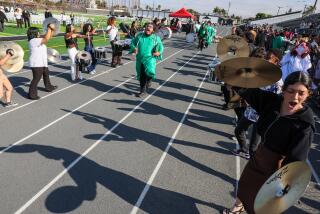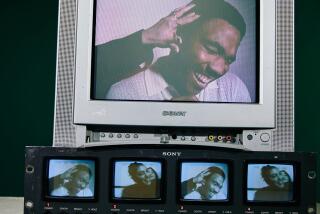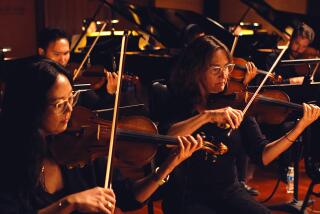Music School Turns Ear Toward Teamwork, Professionalism
- Share via
There’s an old adage that those who can, do; those who can’t, teach. But tell that to Dick Grove and he’ll just laugh.
The president and founder of the Grove School of Music, a private contemporary music school in Van Nuys, was pretty busy in the music business before he started conducting his first classes in 1973.
An Indiana native, Grove moved to Los Angeles from Denver in 1956. He was a composer and arranger for performing artists--Nancy Wilson, the Hi-Lo’s, Gerald Wilson and Rosemary Clooney--and for television--”The Andy Williams Show,” “The Dean Martin Show,” specials for Bill Cosby, Diana Ross and Carol Burnett. He was also a jazz pianist.
“I was putting in 16-hour days then, just like I am now,” Grove said as he sat in his spacious school office, which contains a baby-grand piano and a large-screen Macintosh computer.
The 38,000-square-foot building, site of the school for the past 2 1/2 years, once housed theDaily News. Now, in more than 20 classrooms, about 250 full-time and 350 part-time students pay an average of $9,000 a year for instruction by 100 full- and part-time teachers.
In the mid-’70s, Grove decided that he had a yen for teaching, and he all but stopped writing music (he had stopped playing earlier).
“I don’t miss it,” he said, lighting a cigarette and leaning back in his desk chair. The craggy-faced 63-year-old with an easy smile said: “All those hours spent in a room by yourself. Let somebody else do it.”
He is director of the school’s composing and arranging, and keyboard programs. The school also offers courses in specific instruments, recording engineering, singing and songwriting. It has been accredited since 1979 by the National Assn. of Schools of Music as a non-degree-granting, private, post-secondary institution.
“It’s not quite like dying and going to heaven, but it’s close,” he said with a laugh. “What really turns me on is dealing with the people. This is more important to me than writing a TV show. When you start to give people information they can take with them all their lives, that’s important.
“In a way, I’m a salesman for music.”
Grove’s view of music education--which has remained basically unchanged since the first Grove school in a small building on Ventura Boulevard--is much like the Boy Scout motto: Be prepared.
“Our philosophy is that you go to school here to become a better musician,” he said. “So it’s about musicianship in a pragmatic way. You become literate about music. We’re appealing to the musician that wants the long haul, that wants a career as a professional.”
The students at the school, where Grove, composer Allyn Ferguson and conductor Nick Perito are the operating owner-partners, are exposed to all styles of popular music. “We deal with all the musics, from funk to Latin to rock to pop to heavy metal. But we use jazz as a vehicle because it’s the way, through its harmonic construction, to develop a player’s ears,” Grove said.
“And here we stress giving students an educated ear because contemporary music is ear music. You have to hear it inside your head.”
Grove’s hands-on approach to music education brings students of different disciplines together in a manner that closely resembles professional working situations.
“We wanted a school where everything was integrated, where students could work like real people work,” he said, his pencil rhythmically drumming on his desk blotter. “For example, some of my students will write arrangements for singers, and we’ll have a recording session where the writers conduct it, the singers sing it and the engineers record it--all under direct supervision. That way it has real meaning for them.”
Thom Mason, chairman of the department of jazz studies at USC, taught ear-training and band at Grove a decade ago.
“I admire him and what he’s doing,” he said of Grove. “I think he offers something that is needed, a bridge between the academic university environment and sort of the ‘I don’t know where to go to school, I think I’ll study privately’ frame of mind. He performs a valuable service, and what he does, he does well.
“Still, I would like to see Dick’s school try to address the training of the kids, through the inclusion, say, of college prep classes, that if they want to go to a four-year school other than University of LaVerne or Biola University, they will be able to make the transition to those schools more easily.” LaVerne and Biola accept Grove credits.
For teachers, Grove has always turned toward musicians who have demonstrated expertise in more than one area. For example, drummer Peter Donald, co-director of the Grove percussion program, has played jazz with Denny Zeitlin, Bob Florence, Toshiko Akiyoshi and John Abercrombie, pop behind Helen Reddy and Olivia Newton-John, and has had extensive experience as a session drummer and electronic drum machine craftsman in Los Angeles recording studios.
Donald, who considers jazz drumming his strongest talent, said he would also rather teach than do studio work.
“Although one of the major selling points for the school is to make someone function more effectively in the music business, what we really offer is a love of music, a deeper understanding of it, of its roots and aesthetic importance,” he said.
Pianist David Goldblatt found this to be true. “I was just a piano player when I enrolled,” he said. Now he composes and arranges and plays keyboards with sax player Brandon Fields and guitarist Scott Henderson’s Tribal Tech. He also scores occasional TV source music. “I had a little writing experience, but never had the confidence to write for all the instruments in the orchestra. I took a yearlong composing and arranging program. It was nuts-and-bolts training, like boot camp, and after half a year, we were writing out things, having them played, directing them. The training has really come in handy.”
Grove said the school has been successful in turning out professional musicians. Ninety percent of his full-time students graduate, and 75% to 80% of those make a living with their music, he said.
One of the benefits of the school that you won’t find in the catalogue is that students get lessons in life as well as music, Grove said.
“It’s a life school,” he said. “I asked one of our recent graduates, ‘Did you learn anything this year?’ and he said, ‘Yeah, and a little bit about music, too.’ He found out about himself. You can’t write and play good music unless you know yourself. Music’s so hooked up with how a person thinks emotionally. The first goal is to be happy with yourself.”
Besides teaching more than 30 hours a week and running the school, Grove writes some of the textbooks. Other teachers also write their own books. “That way we don’t have to follow what someone else says. We’re teaching our own way,” he said.
A new series of classes in everything from sight-reading and ear-training to advanced film scoring started in January.
“I love figuring this stuff out and how to teach it,” Grove said, with one of those big grins on his face. “And as we get better, it makes the job easier to do and more do-able. After 17 years, we got most of the bugs out. My goal is to just make it work better. The point of all of this is to make music better.”
More to Read
The biggest entertainment stories
Get our big stories about Hollywood, film, television, music, arts, culture and more right in your inbox as soon as they publish.
You may occasionally receive promotional content from the Los Angeles Times.










